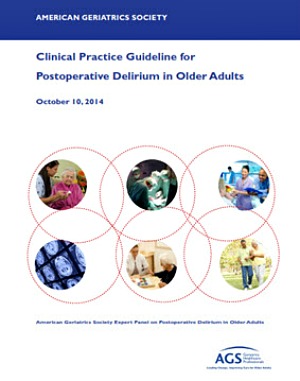 In June 2011, I wrote about my then-80-year-old father’s experiences with post-operative confusion -- otherwise known as delirium -- following triple bypass surgery. Three-and-a-half years later, that post continues to draw thousands of readers every month, along with comments that express the frustration and heartbreak that is still all too common among families dealing with the issue.
In June 2011, I wrote about my then-80-year-old father’s experiences with post-operative confusion -- otherwise known as delirium -- following triple bypass surgery. Three-and-a-half years later, that post continues to draw thousands of readers every month, along with comments that express the frustration and heartbreak that is still all too common among families dealing with the issue.
So I’m pleased to share the news that our colleagues at the American Geriatrics Society (AGS) have released a guideline for health care professionals that I hope will greatly reduce the confusion and frustration so many older adults and their families have to endure as a result of failures to prevent, identify, or properly manage delirium after surgery.
The new Clinical Practice Guideline for Postoperative Delirium in Older Adults offers a framework that will enable hospital systems and health care professionals to implement actionable, evidence-based interventions, both nonpharmacologic and drug-based, to improve delirium prevention and treatment.
We only wish someone at the hospital would have educated us before the surgery—the emotional toll on the family was overwhelming and much of it could have been avoided with a little bit of information up front.
The guideline was developed by a multi-specialty, multi-disciplinary panel of experts co-chaired by Sharon Inouye, MD, MPH, and Tom Robinson, MD. According to the panel, the annual cost of delirium in the United States is estimated to be $150 billion. And because delirium is preventable in up to 40 percent of patients, it is an area ripe for improved care, better outcomes, and lower costs.
Not to mention reducing the emotional toll it takes on patients and their families who have to deal with it.
Recently, a reader named Rich posted this comment on my original Health AGEnda article:
Just another person chiming in to say that I wish doctors would inform family that confusion/delirium is not uncommon with an elderly patient who undergoes a procedure under general anesthetic. We could have planned better, been emotionally much better prepared and probably deal with the situation much better if the doctor gave us proper information. As it stands, I just hope any damage isn’t permanent.
This issue seems to be something doctors don’t want to discuss for some reason until after the problem arises!! Families really should be prepared as it is not easy to deal with such a situation.
A year earlier, another reader shared the story of her 87-year-old mother, who experienced “horrific, terrifying hallucinations” following hip surgery. The nursing staff told the family that their mother would come out of it, and she did. This reader wrote:
We only wish someone at the hospital would have educated us before the surgery—the emotional toll on the family was overwhelming and much of it could have been avoided with a little bit of information up front. I see a real need for hospitals to include educating family and caregivers as part of their on-going training programs. Thank you to everyone for posting their stories. I wish I had known about this condition before Mom’s surgery. I hope everyone else’s has a positive ending.
We’ve received dozens of similar comments, ranging from frustration over the lack of information provided before surgery to a misdiagnosis of dementia, which is still often confused with delirium—even by health care professionals. The new guideline, which I’m proud to note was funded through a grant from the John A. Hartford Foundation in support of the AGS Geriatrics-for-Specialists Initiative (GSI), should help resolve many of those issues.
In addition to the new guideline, a companion Best Practices Statement is now available through open access on the American College of Surgeons website, and will be published in the Journal of the American College of Surgeons in early 2015.
So if you know an older adult who is going in for surgery, your best option—as always in matters of personal health—is to be informed and engaged. You can find a list of the right questions to ask about delirium on HealthinAging.org. The site also offers a PDF containing Tips for Managing Delirium in Older Adults, as well as other resources.
And you can subscribe to our Front pAGE e-newsletter for monthly updates on the work of our grantees to tackle issues, like delirium, that cause harm to older adults.
It breaks my heart that so many families still have to go through what my family did in 2011. But I’m grateful for the dedication and hard work that the experts on the AGS panel put in to come up with a guideline that will equip health care professionals and hospital systems with the knowledge they need to do a better job in preventing and treating postoperative delirium.
